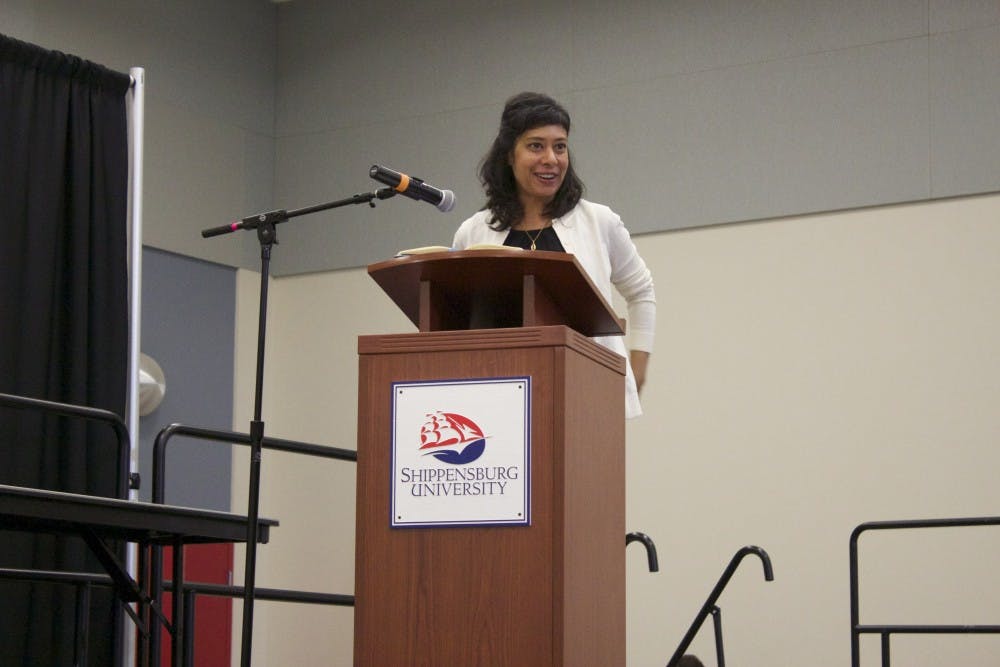Rinku Sen did not always identify as a woman of color.
When her family came from India to the United States when she was a young girl, Sen felt like she stood out in school.
“Every once in a while, something would happen that would make me feel strange inside,” Sen said.
The white girls did not come to her birthday party. This made her feel strange.
A guidance counselor told 11-year-old Sen that she could skip a grade — complimenting her on her intelligence — but then asking, why are you Asians so smart? This, too, brought up those strange feelings.
I had no racial framework, Sen said.
That child would grow up to become the president and executive director of the racial justice organization, Race Forward, publisher of the news site Colorlines.com and the keynote speaker at Shippensburg University’s Day of Human Understanding.
On Tuesday, March 24, Sen spoke in the Ceddia Union Building (CUB) multipurpose room about her life story and social justice.
Sen did not identify as a woman of color until she faced a sort of intervention from her friends at Brown University.
During her sophomore year in 1984, a racial justice campaign started at Brown. A rally was organized and Sen’s friends wanted her to go.
“I don’t think that’s for me,” Sen told them.
Dumbfounded, Sen’s friends tried to convince her to attend. You are a woman, you are a person of color, they told her.
Sen went to the rally and, for the first time in the 12 years since she moved to the U.S., Sen felt like she belonged.
Through the early stages of her activism, Sen helped get the charters of two Brown fraternities revoked.
Some fraternity members used to sit outside the quad and rate women on a scale of 1 to 10 as they walked by. The women put an end to that.
One hundred and twenty women at Brown gathered together to create a campaign to end sexual violence, holding a speak-out for women to air their grievances.
The speak-out lasted 4 1/2 hours and in the end, the fraternities lost and the women won.
Today, Brown’s campus is very different from the time when Sen graduated, but that does not mean activists are done with their work.
When Sen appeared on Fox News, someone in the elevator asked her what type of work she did. Sen told him she leads a racial justice organization, to which he replied, “You got Oprah, you got Obama. What more do you want?”
The question echoed in the CUB multipurpose room — what more do you want?
Sen wants a lot of things. More specifically, she wants people to realize that the U.S. is not post-racism.
If the U.S. elects a female president in the next election, that will not mean that the country is post-gender, she said. Simply having a black president does not mean that racism is gone from the U.S.
People need to redefine discrimination, Sen told the crowd at SU.
Sen encouraged student groups to work together to organize events, instead of one group creating an agenda and then asking others for support.
“I liked the fact that she gave us practical ideas for social change,” junior Brooke Crist said of Sen.
Spanish professor Rob Lesman came to the event to support Stephanie Erdice, the director of the Women’s Center.
In addition to being at the event for the Day of Human Understanding, Sen came to speak in honor of Women’s History Month.
“I was very interested in the topic and I was very interested in the lecture because it gives me a personal perspective on issues that sometimes I look at more from an academic side of things,” Lesman said of Sen’s speech that day.
After graduating from Brown with a degree in women’s studies, Sen went on to work as a community organizer and eventually obtained her master’s degree in journalism from Columbia University.
When Sen is not busy managing Race Forward and its website, she speaks at universities, like SU, to educate students about the injustices that are still alive in the world.
Before Sen took to the stage in the CUB, SU student athletes spoke about the launch of their “I don’t say” campaign, which takes a stand against offensive words. Posters of athletes were on display in the multipurpose room, accompanied by sayings such as, “I don’t say throw like a girl because my strength is not limited by my gender.”
Recipients of the Gero Award were also announced by Stephanie Erdice and Rebecca Ward, women’s studies professor. The award is given to people who make outstanding contributions toward improving the status and condition of women on campus, according to the Women’s Center.




The Slate welcomes thoughtful discussion on all of our stories, but please keep comments civil and on-topic. Read our full guidelines here.